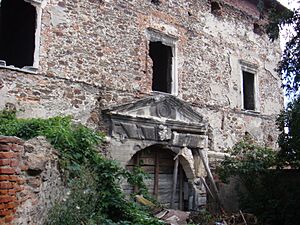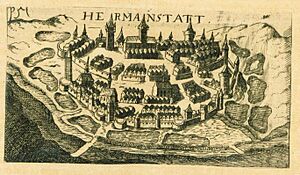Gabriel Báthory facts for kids
Quick facts for kids Gabriel Báthory |
|
|---|---|
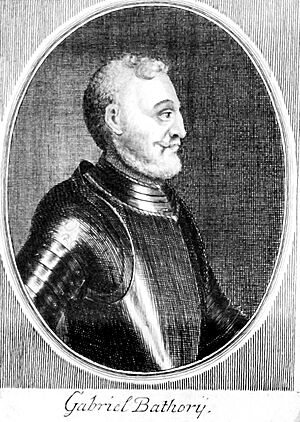 |
|
| Prince of Transylvania | |
| Reign | 1608–1613 |
| Predecessor | Sigismund Rákóczi |
| Successor | Gabriel Bethlen |
| Born | 15 August 1589 Várad, Principality of Transylvania |
| Died | 27 October 1613 (aged 24) Várad, Principality of Transylvania |
| Burial | Nyírbátor |
| Spouse | Anna Horváth Palocsai |
| Father | Stephen Báthory |
| Mother | Zsuzsanna Bebek |
| Religion | Calvinism |
Gabriel Báthory (born August 15, 1589 – died October 27, 1613) was a powerful leader who served as the Prince of Transylvania from 1608 to 1613. Transylvania was a special region that was part of the old Kingdom of Hungary, but it also paid tribute to the mighty Ottoman Empire.
Gabriel came from the famous Báthory family, who were originally Roman Catholic. Many of his relatives had ruled Transylvania before him. His father, Stephen Báthory, owned a lot of land but never became prince. When Gabriel's father died in 1601, Gabriel was still young. He became the responsibility of his childless cousin, Stephen Báthory. This cousin was Protestant, and he helped Gabriel change his religion to Calvinism.
After his cousin died in 1605, Gabriel inherited most of his lands. This made him one of the richest landowners in Transylvania and Royal Hungary, which was controlled by the Habsburg Empire. Gabriel then teamed up with the Hajdús, who were a group of brave, independent soldiers. With their help, he challenged the older prince, Sigismund Rákóczi, in February 1608. Rákóczi decided to step down, and the Diet of Transylvania (a kind of parliament) easily chose Gabriel as the new prince. Both the Ottoman Sultan and the Habsburg ruler, Matthias II, agreed to his rule.
However, Gabriel didn't always respect the rights of the Transylvanian Saxons, who were a German-speaking group living in Transylvania. He even took over their richest town, Szeben (now Sibiu in Romania), which led to a rebellion in 1610. He also tried to take control of Wallachia, another state that paid tribute to the Ottomans. His actions and his talks with Matthias II made the Ottoman Sultan Ahmed I very angry. The Sultan decided to replace Gabriel with another nobleman, Gabriel Bethlen. In August 1613, Ottoman troops invaded Transylvania. The Diet then removed Gabriel from power. He was later killed by Hajdú soldiers.
Contents
Early Life and Growing Up
Childhood Years
Gabriel Báthory was born in Várad (now Oradea in Romania) on August 15, 1589. His father, Stephen Báthory, was a cousin of Sigismund Báthory, who was also a Prince of Transylvania. At the time Gabriel was born, his father was a captain in Várad. Gabriel's mother was Zsuzsanna Bebek. Sadly, her first four children had not survived past infancy.
In 1592, Gabriel's family moved to the old Báthory castle in Szilágysomlyó (now Șimleu Silvaniei in Romania). Transylvania became a separate principality in the 1540s after the old Kingdom of Hungary broke apart. The princes of Transylvania were chosen by the Diet (parliament) and had to be approved by the Ottoman sultans. The Habsburg kings of Royal Hungary also saw Transylvania as part of their lands. The Diet of Transylvania was made up of representatives from the Three Nations: Hungarian noblemen, Saxon townspeople, and the Székelys.
Many Transylvanian noblemen did not want to join the Holy League against the Ottoman Empire. Gabriel's uncle, Balthasar, was a leader of this group. In 1594, Prince Sigismund Báthory had Balthasar captured and killed. Gabriel's father fled to Poland, leaving his family behind. Five-year-old Gabriel, his mother, and his baby sister, Anna, were put in prison. Another uncle, Cardinal Andrew Báthory, asked the Pope for help. Gabriel and his family were freed and went to Poland. His mother became very sick and died in late 1595.
After 1595, the Ottomans won many battles. Sigismund Báthory stepped down in 1599, and Gabriel's uncle Andrew became prince. Gabriel's family returned to Transylvania. However, Michael the Brave, Prince of Wallachia, invaded Transylvania and defeated Andrew. After Andrew was killed, Michael the Brave took control of Transylvania. Gabriel's father fled and promised loyalty to the Holy Roman Emperor, Rudolph, before he died in 1601.
Under Guardianship
After his father died, Gabriel and his sister Anna were looked after by their father's cousin, Stephen Báthory. They lost most of their father's lands. Szilágysomlyó was taken by the royal treasury, and other lands were taken by a distant cousin. Gabriel was taught by a scholar named János Czeglédi. Stephen Báthory, who was very rich, also helped Gabriel change from Catholicism to Calvinism. Gabriel was known for his great strength; it was said he could break horseshoes with his bare hands!
In 1603, Emperor Rudolph's troops took over Transylvania. They started taking land from noblemen, often on false charges. In 1604, a wealthy landowner named Stephen Bocskai was accused of secretly talking with exiles. To avoid prison, he started a rebellion with the help of the Hajdús. Even though Stephen Báthory didn't openly support Bocskai, he sent Gabriel to Bocskai's court. Sixteen-year-old Gabriel fought in a battle in 1605.
Becoming a Leader
Bocskai was chosen as Prince of Transylvania in February 1605. Stephen Báthory, Gabriel's guardian, died in July 1605. He left most of his lands to Gabriel, making him one of the richest noblemen. Bocskai hinted that he saw Gabriel as his possible successor. Young noblemen and military leaders, including Gabriel Bethlen (who would later become Gabriel's enemy), also supported Gabriel. Gabriel held many feasts to become popular with Bocskai's court.
Bocskai died in December 1606. Gabriel immediately wrote to the Ottoman grand vizier, asking for the Principality of Transylvania. Bocskai's deputy, Sigismund Rákóczi, continued to rule Transylvania with the Diet's approval. Gabriel tried to get support from others, but some of his allies were imprisoned.
The Diet of Transylvania wanted to show they could choose their own prince. They first made a rule that no one under a certain age could be prince, which stopped Gabriel. They then chose Rákóczi as prince in February 1607. Gabriel gathered his own troops, saying he only wanted to protect Transylvania. He also asked Emperor Rudolph to make him governor, and even said he would become Catholic again to get support. Rudolph made him governor in June, but it didn't really change Gabriel's power. Gabriel married Anna Horváth Palocsai a few months later.
The Hajdús, who hadn't been paid for months, rebelled in late 1607. They offered their support to Gabriel, who at first refused. But soon, Gabriel began talking with them. They made a deal in February 1608. Gabriel promised to give the Hajdús land, and they promised to help him take Transylvania. The Ottoman grand vizier also decided to support Gabriel.
Gabriel sent a message to Rákóczi, offering him help if Rákóczi stepped down. Gabriel also told Rudolph's representative that Rákóczi had agreed to leave. The Hajdús took control of some areas, but Gabriel stopped them from invading Transylvania itself. On March 5, 1608, János Petki announced Rákóczi's abdication (stepping down) at the Diet in Kolozsvár (now Cluj-Napoca in Romania).
Gabriel's Time as Prince
Starting His Rule
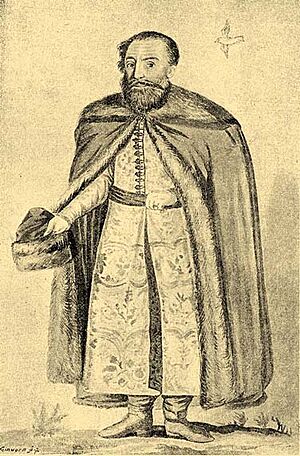
The Diet chose Gabriel as prince on March 7, 1608. Even though it was called a "free" election, Gabriel had the strongest army, so no one could really stop him. He promised to follow the laws and respect the rights of the Three Nations. He was officially made prince in Kolozsvár on March 31. The Diet also gave him the lands of Fogaras and Kővár as his own. He began settling the Hajdús in new villages, giving land to about 30,000 of them during his rule.
Gabriel wanted to show his power over Wallachia and Moldavia, two other states that paid tribute to the Ottomans. He tried to remove Prince Radu Șerban of Wallachia, but his advisors told him not to. Radu Șerban then promised loyalty to Gabriel. Later, the young Prince Constantin I Movilă of Moldavia also recognized Gabriel's power and promised to pay tribute. Gabriel visited Brassó (now Brașov in Romania), a Saxon town. His big parties there made the townspeople angry.
Gabriel sent his trusted men to Istanbul and Kassa to get his rule approved by the Ottoman Sultan and the Habsburg ruler. After talks, Gabriel's representatives and those of Matthias (Rudolph's brother) signed two agreements in August. These agreements recognized Gabriel as the rightful ruler of Transylvania. In November, Gabriel received a special letter from the Sultan, confirming his election and saying Transylvania didn't have to pay tribute for three years.
In June 1609, Gabriel helped Romanian Orthodox priests who were being treated like serfs (farmers tied to the land). He freed them from taxes and demands from landowners. He also let them move freely. In October, the Diet, at Gabriel's suggestion, removed special tax breaks for some noble lands.
A Plot Against Him
One night in March 1610, while Gabriel was sleeping, a man entered his room. The man confessed that István Kendi and other noblemen had hired him to kill Gabriel. Kendi escaped, but others were caught. The Diet sentenced them to death and took their lands. Gabriel then made Imreffy his chancellor and Bethlen the captain of the Székelys.
No one is completely sure why they wanted to kill Gabriel. Some said it was because his Hajdú soldiers were causing too much damage. Others said Catholic noblemen wanted to get rid of the Protestant prince.
Gabriel met with György Thurzó, a high-ranking official in Royal Hungary, in June. Gabriel said he was a sovereign ruler, while Thurzó was just a "lord's serf." After returning to Transylvania, Gabriel planned to unite Royal Hungary and Transylvania under his rule with Ottoman help. He asked Moldavia and Wallachia for soldiers and the Saxons for a lot of money. But Moldavia didn't send troops, and the Saxons paid only a small amount. Gabriel's men continued to talk with Thurzó, and they reached a deal in August. However, Matthias II didn't approve it because it said Transylvania didn't have to help Royal Hungary against the Ottomans.
Troubles and Battles
In December, Gabriel went to Szeben (now Sibiu in Romania), the richest Saxon town. Even though he only had 50 soldiers with him, his army was waiting outside. He pretended he just wanted to look at the town gate. While it was open, his army marched in and took the town without a fight. He said he did this because Saxons sometimes refused to let rulers into their towns. Some thought Gabriel wanted to move his capital to Szeben. The Diet declared Szeben the new capital in December, taking away some of its special rights.
Gabriel then started a military campaign against Wallachia in December. Prince Radu Şerban fled, and Gabriel took control of Târgoviște. In January 1611, Gabriel called himself the Prince of Wallachia. His troops caused a lot of damage. Gabriel sent messengers to the Ottoman Sultan Ahmed I, asking him to confirm his rule in Wallachia. He even suggested a plan to conquer Poland! The Ottomans started calling him "Deli Kiral" (Mad King) because of his bold actions.
The Ottoman governors invaded the Hajdú villages, forcing Gabriel's soldiers to rush back to defend their homes. Sultan Ahmed I then gave Wallachia to Radu Mihnea and told Gabriel to return to Transylvania. Gabriel was angry but had to accept it. Radu Şerban then drove Radu Mihnea out of Wallachia with an army of Cossack and Moldavian soldiers. The Diet ordered the Transylvanian army to gather and allowed Gabriel to collect a special tax. However, Michael Weiss, the mayor of Brassó, encouraged his townspeople to rebel against Gabriel. Gabriel sent a Hajdú captain to attack Brassó, but Weiss bribed him to stop. Radu Şerban then invaded and defeated Gabriel's army near Brassó in July 1611. Gabriel barely escaped.
Matthias II saw Gabriel's attack on Wallachia as a betrayal. He believed Transylvania and the two Romanian principalities belonged to the Hungarian Crown. A Hungarian commander invaded Transylvania. Most Transylvanians saw this as wrong, and only the Saxons supported the invasion. The Hungarian commander and Radu Şerban besieged Szeben, but couldn't capture it. Gabriel asked the Ottomans for help. The Hajdús then left the Hungarian army and defeated their reinforcements. When Ottoman troops arrived to help Gabriel, Radu Şerban and the Hungarian commander had to leave Szeben. Gabriel's army defeated the retreating royal troops.
Gabriel led his army to Várad, but the Ottoman troops didn't go with him. Hungarian leaders convinced Thurzó to talk with Gabriel. They signed an agreement in December. Gabriel promised to send representatives to the Diet of Hungary. However, Matthias II would not approve the treaty until Gabriel made peace with the Saxons.
Meanwhile, Gabriel sent a Hajdú captain named András Géczi to Istanbul to thank the Ottomans. But Géczi secretly made a deal with Michael Weiss in Brassó. He asked the Ottomans to remove Gabriel from power. The Ottoman Council agreed and decided to replace Gabriel with Géczi. When the people of Brassó refused to surrender, Gabriel attacked their area and captured seven Saxon fortresses in March and April 1612. The Diet of Transylvania urged the Saxons of Brassó to give up. In May, Gabriel suggested that Transylvania should no longer be under the Sultan's rule, but the Diet refused.
Géczi sent letters to András Nagy, who promised to kill Gabriel. But Nagy's letter was found. Gabriel then had Nagy killed in August. Gabriel Bethlen, who supported the Ottomans, fled to Ottoman land in September. He talked with Ottoman governors and the grand vizier. Weiss, who wanted to make Géczi prince, left Brassó with an army in October 1612. Gabriel attacked Weiss and his troops, defeating them six days later. Weiss was killed, and Géczi went back to Brassó. The Diet sentenced Géczi and Bethlen to death, but offered forgiveness to those who surrendered.
The End of His Rule
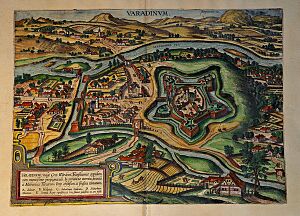
The Diet allowed Gabriel to talk with Matthias II. They signed an alliance in December 1612. Matthias sent his people to Transylvania to tell the Saxons to surrender to Gabriel. This treaty made Sultan Ahmed I very angry, and he decided to replace Gabriel with Bethlen in March. Matthias and Gabriel made a new treaty in April, and Matthias recognized Gabriel's right to rule Transylvania. In a secret deal, Gabriel promised to support Matthias even against the Ottomans. Gabriel also forgave the Saxons and Géczi, making Géczi commander of his guard.
Gabriel Bethlen left Istanbul in August, with the Pasha of Kanizsa. Radu Mihnea invaded Transylvania from Wallachia in early September. The Khan of the Crimean Tatars also invaded three weeks later. By early October, Ottoman troops arrived to support Bethlen. Gabriel fled Transylvania and went to Várad, asking Royal Hungary for help. A Hungarian army of 2,000 soldiers came to Várad.
Skender Pasha called the representatives of the Three Nations to a Diet. On October 21, they removed Gabriel from power and chose Bethlen as prince two days later. According to some historians, András Géczi and Miklós Abaffy plotted to kill Gabriel in Várad. On October 26, they entered his room and convinced him to give them his sword. The next day, Abaffy told Gabriel that the Hungarian troops wanted to see him. After visiting the army, Gabriel returned to Várad in a carriage. Horsemen suddenly attacked the carriage, forcing it into a narrow street. Gabriel jumped out, but was shot. He tried to fight back near a willow tree by the Pece Stream, but many Hajdús attacked and killed him.
Gabriel's body was taken to Nagyecsed and then to Nyírbátor. It lay unburied for a long time in the church crypt. He was finally buried properly in 1628, by order of Gabriel Bethlen.
Historians have different views on Gabriel's rule. Some say he was too wild and didn't manage the different groups in Transylvania well. They say he didn't realize the Ottoman Empire was strong again and wouldn't allow his big plans. Other historians say that Gabriel's bad reputation comes from writers who worked for Gabriel Bethlen, who wanted to make his predecessor look bad. They point out that many common people were sad when Gabriel died. A 20th-century Hungarian writer called Gabriel Báthory a "true fairy prince," but added that "fairies are unfit for this world."
Family Connections
Gabriel Báthory's father was Stephen Báthory, and his mother was Zsuzsanna Bebek. His grandparents included András Báthory and Margit Majláth on his father's side, and György Bebek and Zsófia Patócsy on his mother's side. His great-grandparents included Stephen Báthory and Catherine Telegdi.
Images for kids


